Instead of taking a break from their college studies this past summer, Hwan Kim and Arnav Bawa chose to immerse themselves in areas of engineering, science and technology at the core of their educational and career aspirations.
Kim is preparing to graduate in December from the Ira A. Fulton Schools of Engineering at Arizona State University with a bachelor’s degree in computer science. He says he is likely to pursue a graduate degree in his near future. 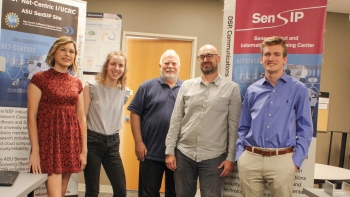 Professor Andreas Spanias (center), director of the Sensor Signal and Information Processing Center at Arizona State University, is pictured with past participants in the center’s Research Experience for Undergraduates and Research Experience for Teachers sessions. Pictured from left: Ashley Fauss, a science teacher at Sonoran Trails Middle School in Phoenix, and recent ASU biomedical engineering and business graduate Lauren Everett. Pictured from right: Recent ASU biological sciences graduate Michael Esposito and Filippo Posta, a mathematics teacher at Estrella Mountain Community College in Avondale, Arizona. Photo courtesy the Sensor Signal and Information Processing Center at ASU Download Full Image
Professor Andreas Spanias (center), director of the Sensor Signal and Information Processing Center at Arizona State University, is pictured with past participants in the center’s Research Experience for Undergraduates and Research Experience for Teachers sessions. Pictured from left: Ashley Fauss, a science teacher at Sonoran Trails Middle School in Phoenix, and recent ASU biomedical engineering and business graduate Lauren Everett. Pictured from right: Recent ASU biological sciences graduate Michael Esposito and Filippo Posta, a mathematics teacher at Estrella Mountain Community College in Avondale, Arizona. Photo courtesy the Sensor Signal and Information Processing Center at ASU Download Full Image
Bawa is on track to earn his bachelor’s degree in electrical engineering in spring 2023 and then complete work for a graduate degree in the field by May 2024 through the Fulton Schools accelerated master’s degree program.
But whatever advanced knowledge they acquire from this point on, Kim and Bawa say the nine weeks they spent this summer in the Research Experience for Undergraduates, or REU, program will definitely rank as a high point on their higher education learning curves.
Both participated in an REU in ASU’s Sensor Signal and Information Processing, or SenSIP, center, co-directed by Professor Andreas Spanias and Associate Professor Jennifer Blain Christen, who teach in the School of Electrical, Computer and Energy Engineering, part of the Fulton Schools.
Funded by the National Science Foundation, or NSF, REU programs give undergraduate students opportunities to conduct research under the guidance of engineering and science faculty members who are leaders in their fields, Spanias says. SenSIP began its REU summer program in 2017.
Kim’s research combined neural networks and quantum computing, while Bawa used advanced software to explore a new method of treating tumors using electromagnetic waves.
Working with fellow REU electrical engineering student David McComas and co-advised by Spanias and Glen Uehara, who works in the Quantum Laboratory at General Dynamics, Kim explored a new area of quantum computing.
Kim says through REU, he got the challenging but valuable experience of tackling a problem that at first glance seemed insurmountable.
“It gave me more confidence in my abilities to solve hard problems, which is the most important skill in computer science,” he says.
Bawa, mentored by Blain Christen, says his experience developing an entirely intracranial, or inside the skull, tumor treatment was fascinating.
“The project is still in early stages, but I was able to gain meaningful experience by using simulation software and understanding the relationship between computational models and experimental results,” he says.
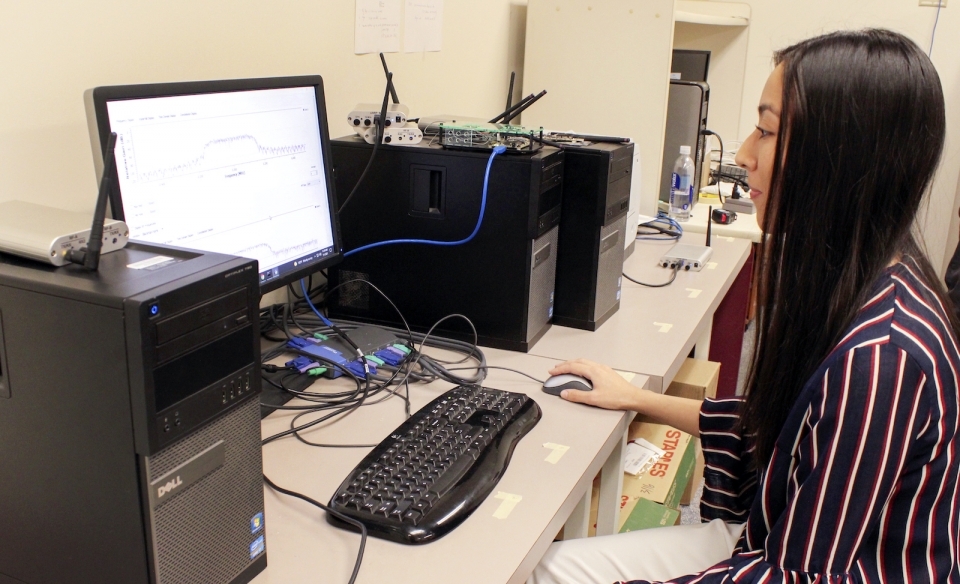
Karla Cosio says her work in the Sensor Signal and Information Processing Center’s Research Experience for Undergraduates program sparked a stronger zeal for learning and discovery that motivated her to pursue a master’s degree in electrical engineering. Photo by Teresa Cordon/ASU
Putting students in position to succeed
Karla Cosio says her work in the Sensor Signal and Information Processing Center’s Research Experience for Undergraduates program sparked a stronger zeal for learning and discovery that motivated her to pursue a master’s degree in electrical engineering. Photo by Teresa Cordon/ASU
SenSIP, which focuses on research in sensor signal processing, digital signal processing, communications and information networks — essential components of many of today’s most advanced technologies — also provides ASU students the benefits of its own numerous connections to experienced researchers and high-tech industries.
Along with support from the NSF, sponsors of SenSIP’s research include General Dynamics, onsemi, Qualcomm, Raytheon Technologies and Samsung. SenSIP has also obtained funding from the U.S. Department of Defense Small Business Innovation Research program, as well as the PSG, Alphacore and Lightsense companies.
Karla Cosio, a recent electrical engineering graduate who was selected as an Impact Award winner for her positive influence on the Fulton Schools community, is among many ASU students who’ve said their education has been meaningfully enhanced through involvement with SenSIP’s REU program.
Cosio says she gained a lot of knowledge about not only conducting research but also presenting scientific results.
For her REU project, Cosio worked with Fulton Schools Lecturer Ahmed Ewaisha, who specializes in wireless communications.
“It really gave me presentation skills. I did my first research poster and my first elevator pitch on my (SenSIP) research,” Cosio says. “These things made me decide to pursue a master’s degree because I found something that I really have a passion for, and I don’t think I would have found it if I didn’t do the research (with SenSIP).”
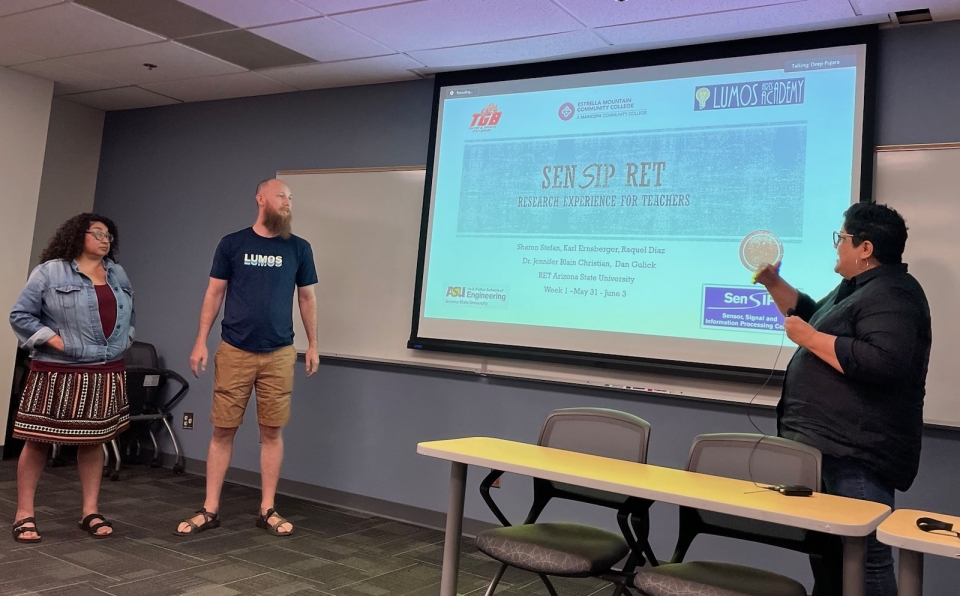
Raquel Diaz (at right) presents a slide presentation describing the introductory training week of the SenSIP Research Experience for Teachers program and the research project selection process for participants. She was joined in the presentation by Karl Ernsberger and Sharon Stefan (at left). Diaz teaches math, algebra, geometry and trigonometry at Trevor G. Browne High School in Phoenix, Ernsberger is a science teacher at Lumos Arts Academy in Mesa, Arizona, and Stefan teaches college mathematics, algebra and calculus for elementary school teachers at Estrella Mountain Community College in Avondale, Arizona. Photo courtesy the Sensor Signal and Information Processing Center at ASU
Expanding awareness of engineering’s value
Raquel Diaz (at right) presents a slide presentation describing the introductory training week of the SenSIP Research Experience for Teachers program and the research project selection process for participants. She was joined in the presentation by Karl Ernsberger and Sharon Stefan (at left). Diaz teaches math, algebra, geometry and trigonometry at Trevor G. Browne High School in Phoenix, Ernsberger is a science teacher at Lumos Arts Academy in Mesa, Arizona, and Stefan teaches college mathematics, algebra and calculus for elementary school teachers at Estrella Mountain Community College in Avondale, Arizona. Photo courtesy the Sensor Signal and Information Processing Center at ASU
SenSIP is seeking to make an impact beyond the goals of the REU program for students. The center currently hosts four other NSF workforce development programs in sensors and machine learning, including an International Research Experiences for Students, or IRES, program and a Research Experiences for Teachers, or RET, program, which began in the summer of 2020.
Nine Arizona high school and community college faculty members participated in SenSIP’s RET program in the summer of 2021. Six teachers participated in this past summer’s program.
Among them was Abdullah Mamun, who currently teaches for the Maricopa Community College District, as well as Grand Canyon University and Benedictine University, which has a satellite campus in Mesa, Arizona.
Mamun, who has an electrical and computer engineering background and now teaches computer science, statistics, biostatistics, mathematics, calculus and trigonometry, recommends to the RET program to fellow teachers.
He found it “a good way for teachers to learn what is coming up in AI, and you can integrate that into your classroom instruction, which is really good for your students.”
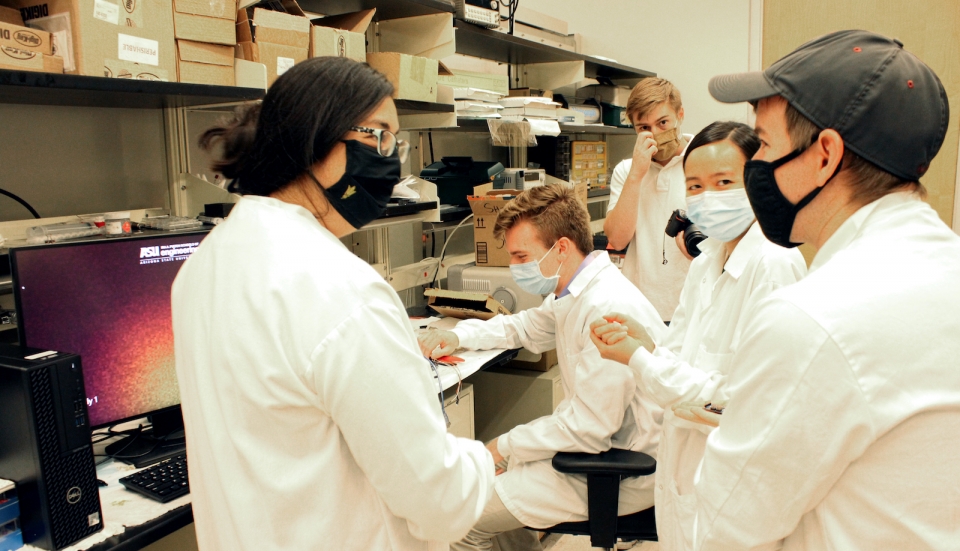
Fulton Schools Associate Professor Jennifer Blain Christen (at left) is pictured with students in the Research Experience for Undergraduates program offered by the Sensor Signal and Information Processing Center, or SenSIP, which she co-directs. She also is director of the BioElectrical Systems and Technology research group at ASU and often brings knowledge gained through the group’s work into her guidance of students and teachers in SenSIP’s research experience programs. (Photo taken during the early days of the COVID-19 pandemic.) Photo by Teresa Cordon/ASU
Exploring new tools, methods and materials
Fulton Schools Associate Professor Jennifer Blain Christen (at left) is pictured with students in the Research Experience for Undergraduates program offered by the Sensor Signal and Information Processing Center, or SenSIP, which she co-directs. She also is director of the BioElectrical Systems and Technology research group at ASU and often brings knowledge gained through the group’s work into her guidance of students and teachers in SenSIP’s research experience programs. (Photo taken during the early days of the COVID-19 pandemic.) Photo by Teresa Cordon/ASU
ASU alumnus Steven Clemens participated in his third RET program this summer. He teaches biological sciences for the Dysart Unified School District northwest of Phoenix, as well as an integrated science course at Valley Vista High School.
“I learned how machine learning is changing the world,” Clemens says. “From smart speakers and cell phones to medical devices and algorithms, the world is constantly changing and the people who make these programs and devices are in high demand.
“My overall goal was to find a way to teach students that working together in a research center is how advancement gets accomplished in the scientific community. My hope is to help open their eyes to a new career path they might not have thought of before because they were too scared to try something new.”
Karl Ernsberger, who teaches science at Lumos Arts Academy in Mesa, says he is currently studying data science, which is what brought him to SenSIP’s RET program.
“My experience in the RET program was fantastic. It was fast-paced and included experts from multiple fields, both as mentors and as peers in the program,” Ernsberger says. “Getting access and training on materials at the ASU campus and working to accomplish a high goal in an actual ongoing project was inspiring.”
“I greatly enjoyed the program and have several new tools to take with me to the classroom because of it,” he adds, “and I am very excited to get involved in another round of research next summer.”
Read an expanded version of this story on Full Circle, the news section of the Ira A. Fulton Schools of Engineering website.
Science writer, Ira A. Fulton Schools of Engineering
480-965-8122 [email protected]
The Murray and Sabina Zemel z”l Educators Conference on the Holocaust and Genocide will be hosted by Arizona State University on Oct. 25 this year after being under the organization of the Bureau of Jewish Education for over 30 years. The conference aims to aid current and future Arizona teachers and educators in building programs, developing curricula and sharing best practices in educating on t…
The Murray and Sabina Zemel z”l Educators Conference on the Holocaust and Genocide will be hosted by Arizona State University on Oct. 25 this year after being under the organization of the Bureau of Jewish Education for over 30 years.
The conference aims to aid current and future Arizona teachers and educators in building programs, developing curricula and sharing best practices in educating on the Holocaust and other genocides. 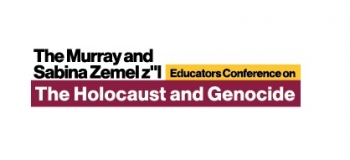 Download Full Image
Download Full Image
With the recent passing of Arizona House Bill 2241, which mandates teaching the Holocaust and at least one other genocide at least twice between seventh and 12th grade, this conference is especially helpful for new teachers who are looking for resources on how to effectively teach these sensitive topics.
The Phoenix Holocaust Association was one of the organizations that championed the bill and helped organize to get it passed. The association’s president Sheryl Bronkesh hopes the bills passage will help students realize their role in preventing future genocides.
“Through examination of the history of the Holocaust, students will learn the roles social, religious, political and economic factors had in the erosion of democratic values and human rights during World War II,” Bronkesh said. “This can enable students to identify contemporary circumstances that can threaten the rule of law and democratic institutions.”
This year’s conference theme is “For a New Generation: Teaching the Holocaust in Arizona Classrooms Today.” It will feature talks on climate issues and genocide, best practices in the classroom, media portrayals of genocide and more.
Jacob Flaws, history lecturer within ASU’s School of Historical, Philosophical and Religious Studies, is the chair of the planning committee for the conference as it moves to ASU. He says this year’s conference will host many exceptional speakers.
“Attendees can expect a wide range of engaging content,” Flaws said. “From our introductory speaker, Dr. Alex Alvarez of Northern Arizona University, to our local area teachers, Kim Klett, Ashley Crose, Tracie McMurray, to ASU Professor Volker Benkert, to Isabel Mann, the teacher programs and curriculum specialist at the National World War II Museum, to Ambassador Edward O’Donnell, who served as U.S. Special Envoy for Holocaust Issues and now teaches for ASU, to our keynote speaker, Ellen Germain, who is current U.S. Special Envoy for Holocaust Issues for the U.S. State Department.”
Local high school teacher Klett has been teaching on these topics for years and encourages other teachers to attend.
“This topic is important because so many lessons can be drawn from the Holocaust and other genocides,” Klett said. “We say ‘Never Again,’ but what does that mean? Why do we still see so many genocides and mass atrocities occurring? How does this history make us think about the way we view and think about others?”
Anyone wanting to attend can learn more and register on the website. It is free and open to the public. The public is invited to register for the keynote address to be held at 3 p.m. at Mirabella at ASU.
The conference is sponsored by the Zemel family, the School of Historical, Philosophical and Religious Studies, the Phoenix Holocaust Association, the Center for Jewish Studies and the Bureau of Jewish Education.
Communications program coordinator, School of Historical, Philosophical and Religious Studies
[email protected]
Contact us



